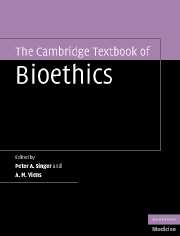Book contents
- Frontmatter
- Contents
- List of contributors
- Acknowledgements
- 1 Introduction
- Section I Information problems
- Section II End of life care
- Section III Pregnant women and children
- Section IV Genetics and biotechnology
- Section V Research ethics
- Section VI Health systems and institutions
- Section VII Using clinical ethics to make an impact in healthcare
- Introduction
- 40 Clinical ethics and systems thinking
- 41 Innovative strategies to improve effectiveness in clinical ethics
- 42 Teaching bioethics to medical students and postgraduate trainees in the clinical setting
- Section VIII Global health ethics
- Section IX Religious and cultural perspectives in bioethics
- Section X Specialty bioethics
- Index
- References
42 - Teaching bioethics to medical students and postgraduate trainees in the clinical setting
Published online by Cambridge University Press: 30 October 2009
- Frontmatter
- Contents
- List of contributors
- Acknowledgements
- 1 Introduction
- Section I Information problems
- Section II End of life care
- Section III Pregnant women and children
- Section IV Genetics and biotechnology
- Section V Research ethics
- Section VI Health systems and institutions
- Section VII Using clinical ethics to make an impact in healthcare
- Introduction
- 40 Clinical ethics and systems thinking
- 41 Innovative strategies to improve effectiveness in clinical ethics
- 42 Teaching bioethics to medical students and postgraduate trainees in the clinical setting
- Section VIII Global health ethics
- Section IX Religious and cultural perspectives in bioethics
- Section X Specialty bioethics
- Index
- References
Summary
As he reviews the curriculum for his surgical residency training program, Dr. A is concerned about how to prepare his residents to gain understanding of biomedical ethics as it relates to the specialty and to use their understanding to improve patient care (Royal College of Physicians and Surgeons of Canada, 2001). Last year, he invited a moral philosopher to give a guest lecture, which focused on theoretical issues with no reference to how these concepts relate to clinical experience. The residents' evaluations were unfavorable: “a waste of our time,” “not relevant to the problems we face.” Recently, the residents and nurses were troubled by a difficult situation on the ward: Mr. B, a 46-year-old patient, was found to have unresectable pancreatic cancer, but his wife insisted that the staff withhold the diagnosis from him because he is prone to depression. Dr. A wonders whether this situation could serve as a learning opportunity for the residents and staff and whether he should try to lead a seminar about this problem. He pages the chief resident.
What is bioethics teaching and why is it important?
Bioethics is now taught in most medical schools as part of the standard curriculum. Many accrediting bodies require residency training programs to teach bioethics as a condition of approval, and there is increasing interest in bioethics in continuing medical education.
- Type
- Chapter
- Information
- The Cambridge Textbook of Bioethics , pp. 329 - 336Publisher: Cambridge University PressPrint publication year: 2008
References
- 2
- Cited by

